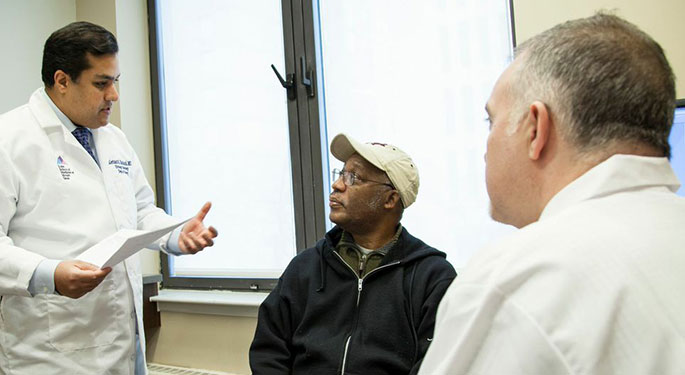Diagnosis and Testing

There are currently no recommended screening tests for kidney cancer. Kidney tumors can grow without causing pain or symptoms, and we often discover them while testing or treating other diseases. If you have a family member who has been diagnosed with kidney cancer, you may want to speak with your doctor about having an ultrasound to evaluate your own kidneys.
At Mount Sinai, we diagnose kidney cancer by conducting a thorough physical examination, including blood tests and urinalysis, and by taking a detailed medical history. We may also use some of these imaging tests.
- Computed tomography (CT) scans help us diagnose kidney cancer, especially if we notice a mass, either by physical examination or on an X-ray. A CT scan allows us to visualize internal organs with great accuracy.
- Magnetic resonance imagining scans are also helpful in diagnosing kidney cancer, especially if you are not a candidate for a CAT scan.
- Bone scans can help detect the spread of cancer to the bones.
- Ultrasound exams use high-energy sound waves to produce images of internal organs. We use it if there is blood in the urine or if we feel a mass on physical examination.
If these imaging tests are inconclusive, we can do a biopsy to determine if you have kidney cancer. With a biopsy, we take a small sample of tumor cells and test them in the laboratory to see if they are cancerous.
Staging and Grading
Staging of cancer is the process of classifying how far a cancer has spread, while grading reflects the characteristics of the cancer’s cells. Staging and grading are important predictors of the course of the disease and treatment success.
Decreasing Cancer Risk
You can make some lifestyle choices that may reduce your risk for developing this disease. Here are some steps you can take.
- Quit smoking or using tobacco in any form. Smoking is associated with increased risk of developing kidney cancer. If you smoke and are having trouble quitting, there are many options available to help you quit, such as support groups, prescription medications, and nicotine replacement products. Your doctor can guide you to find the find the most appropriate option or combination of options.
- Control your blood pressure. High blood pressure (hypertension) is a risk factor for kidney cancer. You and your doctor should determine if you can reduce your blood pressure through diet and exercise or if you need to take medications to lower your blood pressure.
- Maintain a healthy weight. Obesity is linked to kidney cancer. A healthy diet full of lean protein, fruits and vegetables, and heart-healthy fats helps prevent cancer and provides numerous other health benefits.
- Engage in regular physical activity. Regular exercise can help you lose weight and keep it off; it also provides many other health benefits.
- Avoid exposure to toxic chemicals in the workplace. Exposure to certain chemicals can be toxic to your kidneys. Dangerous chemicals include cadmium, asbestos, benzene, and organic solvents.
- Know Your Family History. If an immediate family member has been diagnosed with kidney cancer, you may want to speak with your doctor about having a kidney ultrasound to evaluate your own kidneys. However, most kidney cancers are not directly linked to hereditary conditions.